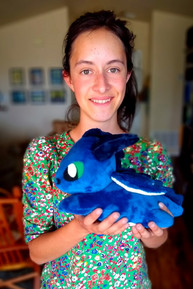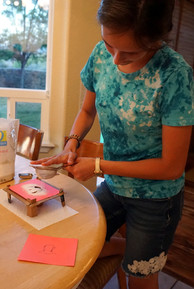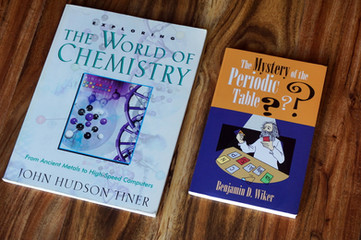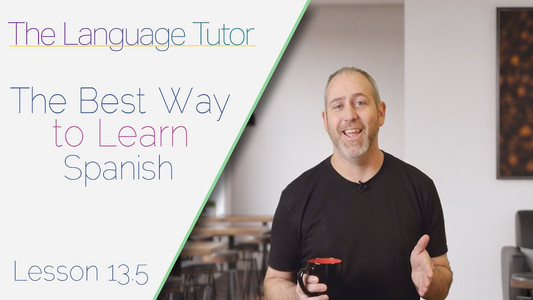Our Homeschool Curriculum for 2023-24 (with a 16-year-old and a 13-year old)
- Sarah

- Aug 12, 2023
- 10 min read
Updated: Dec 23, 2023
This school year, my 16-year-old Alina daughter continues her self-directed studies alongside our all-together schooling. We'll be focusing on world history from 1500-1850, Chemistry, and following the passionate, unique interests of both of my kids. This post will detail our curriculum and resources for the 2023-2024 school year.

Character Comes First
Education is much more than academic learning; it involves our emotional and spiritual development as well. I believe that teaching my children to be honest, responsible, kind people is more important than the acquisition of academic knowledge.
I messed up on this in the early years of our homeschooling by focusing too much on academics. Through painful experience, I was re-oriented and realized that character development has to be paramount over everything else we do in our homeschool.
I intentionally focus on character development through:
Relationship development
Household responsibilities
Discussion of character during read-alouds
Service within our community

Life Skills
When my kids were younger, I focused on teaching them life skills that we worked on together. Now that my kids are older, I’m teaching independent life skills, to ensure that my kids will be ready for life on their own.
Household Responsibilities
Both of my kids have a fairly large list of household responsibilities, which they have been taught and are expected to complete on their own. They are working to master all aspects of home care, including laundry, cleaning, maintenance, etc.
Farm-to-Table
Although they know all about raising chicks and keeping chickens on a day-to-day basis, one aspect that I'm focusing on teaching the kids this year is how to butcher and prepare chickens for our dinner table. Old hens must be periodically culled in order to keep our flock productive, so I'm teaching the kids all about respectful chicken harvest.
Cooking
Each of my kids cooks dinner for the family once a week. They choose the menu for their assigned dinner days. When my schedule allows, I help them learn how to cook new recipes.
Besides simple spaghetti, quesadillas or pizza, some of my kids’ current favorite meals to prepare are:
Ian:
Grassfed beef hamburgers on sprouted grain buns
Alina:
Slow cooker roasted chicken and potatoes
Einkorn pancakes topped with smoked salmon, cucumbers, green onions, capers, and sour cream
Lemon thyme chicken with rice

Individual Needs and Interests
The homeschool philosophy we love is Thomas Jefferson Education. In this homeschool model, rather than children being in specific grades, they are in “Phases” which each have a specific learning focus. There is more info about the Phases here, and in brief, they are:
Core Phase – Age ~0-8 years old – Focused on character development, right and wrong, good and bad, etc
Love of Learning Phase – Age ~8-13 years old – Giving the child the opportunity to fall in love with learning through nurturing their own interests and providing opportunities for exploration of academic subjects
Scholar Phase – Age ~13-18 years old – Focused on study in a wide range of topics with increasing ability and commitment
An important part of nurturing a love of learning in my kids is through encouraging them to pursue their own interests. One of the biggest advantages of homeschooling is that my children have as much time as desired to follow their passions. I'm supporting my children's current interests as follows.
Egg Business
My kids are partners in a small chicken egg business. They work together to take care of the chickens daily, and each earn a small amount of money for every dozen of eggs that are sold. Owning their own business has given my kids the opportunity to learn much about raising and caring for animals, handling and saving money, profit vs. loss, the value of hard work, perseverance, and long-term commitments. They're becoming experts in management of the flock, and they make the hard decisions about keeping their business viable throughout the productive and unproductive egg laying years of their hens.
16-year-old daughter Alina – Scholar Phase + Creating Beauty
Alina is in self-directed Scholar Phase. This means that, in addition to our all-together schooling time, Alina is also pursuing her own studies independently. There is more info about how we implement self-directed Scholar Phase here.
Alina creates her own study plan each semester, with my guidance towards making it balanced as far as content. Go here to see Alina's book list and curriculum plan for this school year. For the last couple semesters, we have been doing mother-daughter book discussions of some of the books on her list and this has been a sweet way for us to learn and discuss together.
Below is Alina's Scholar Contract for September 2023-May 2024. This lays out her responsibilities and benefits, as well as her general plan for her Scholar Studies. She plans to take things easier in late November/December when she will be working on Christmas presents and decorations. There is more about how to create a Scholar Contract in Leadership Education: The Phases of Learning.

Alina is naturally passionate about creating beauty through sewing and decorating. Some of her current passions in this regard are:
Sewing stuffed animals and her Alina's Adorables business
Creating old-fashioned paper holiday decorations
Baking and decorating cupcakes
13-year-old son Ian – Love of Learning Phase + Cars Cars Cars
Ian is in Love of Learning Phase. He has had a lifelong passionate interest in cars and other wheeled vehicles, tools, and machines. I support these interests through:
Getting him involved in household maintenance (such as letting him help with changing bike tires, using the drill and manual staple gun, etc.),
Including a focus on inventors and inventions in our history studies,
Attending car shows and car races,
Providing him opportunities to ride his rollerblades, scooter, and bike,
Paying him to do home maintenance jobs that involve power tools such as sanding the picnic table, clearing brush piles, chopping wood, etc., and
Making sure he has plenty of books about vehicles and machines to read.
A big project Ian will be working on this year is learning how to take apart and rebuild a lawn mower engine (thanks to a friend who gifted us with an engine).
Academic Subjects
I purposely do not push my children academically, but I do give them exposure to plenty of academic subjects and pursuits. We currently have family “kidschool time” for 1-2 hours most mornings, before Alina goes off to do her Scholar Time.
There is more about the how we make our homeschool successful and sustainable here, why the homeschooling environment is more important than curriculum, and more about our general homeschool routine here.
Literature
Literature is foundational to our homeschool. It gives us exposure to different cultures and values, allows us to "walk a mile" in others' shoes, and facilitates important discussions that lead to character growth.
Daily Read-Aloud and Kids’ Book Club
I read aloud classic picture and chapter books to my children most days. Read alouds spark many of our most important discussions about culture and character. One recent change is that we are now taking turns reading aloud to the family in the evenings; this is helping my kids learn public speaking and how to project their voices.
I also lead a children’s read-aloud classic book club once-a-month at our homeschool group. Our recent and upcoming read-alouds include:
A Cricket in Times Square by George Selden
Little Britches: Father and I Were Ranchers by Ralph Moody
Perloo the Bold by Avi
Understood Betsy by Dorothy Canfield (free AUDIO version here)
Half Magic by Edward Eager
Children of the Longhouse by Joseph Bruchac
Pollyanna by Eleanor Porter
Man of the Family by Ralph Moody
Red: The (Fairly) True Tale of Little Red Riding Hood by Liesl Shurtliff

Classic and Fun Audiobooks
My kids are allowed to listen to 1-hour per day of audiobooks, usually during our afternoon Quiet Time. Audio books have been a fantastic way to give my kids exposure to a wide variety of classic books without any additional effort from me. Some of the audio books are free downloads from Librivox.
Recently, my kids have chosen to listen to:
Ranger's Apprentice series by Flanagan
Alcatraz vs. the Evil Librarians series by Sanderson
The Way of Kings by Sanderson
Jane Eyre by Bronte
A Dragon's Guide to the Care and Feeding of Humans by Lawrence Yep and Joanne Ryder
Enchanted Forest Chronicles by Patricia Wrede
Reading
Through a steady habit of read-alouds year-after-year, my children have fallen in love with books. I also make a point of reading on my own frequently; children naturally emulate their parents, so it is important for them to see me engaging in reading and discussing books as part of my own lifelong education.
Alina learned to read at age 4, and Ian learned to read at age 8.5. Although Ian's reading would have been considered "late" were he in school, thankfully I had learned about the wide range of developmental readiness for reading so that my son did not feel pressured or insecure about his reading progression. Some kids like Alina naturally learn to read when they are very young, but it is totally natural that some kids do not read until later, even until as late as 12 to 14 years old. Knowing about this gave me the confidence and patience to (mostly) relax and wait for Ian's reading journey to unfold.
Alina and Ian both choose to read on their own most days. I just need to make sure they have plenty of fresh reading material on-hand. Some of the books their favorite series' that they return to over and over include:
Ranger’s Apprentice series by John Flanagan
Stormlight Archive series by Brandon Sanderson
Skyward Series by Brandon Sanderson
Thrawn books by Timothy Zahn
Brotherband Chronicles by John Flanagan
Hazardous Tales (Graphic Novels) by Nathan Hale
See this post for Alina's 20-book list for this school year. Ian has also chosen to undertake a Reading Challenge for this semester as follows:

Writing, Spelling, and Typing
We don't use a formal curriculum for writing or spelling. Instead, I find ways to incorporate writing into our everyday lives, so that the writing my kids do will have real meaning rather than being a forced exercise. There is more about writing in our homeschool here.
Some of the current ways in which my kids engage in writing are:
Penpals, writing letters to family and friends
Writing stories, on their own or in collaboration with friends
Informal spelling bees, where we take turns asking each other to spell words
Formal spelling bees, once a semester as part of our homeschool group
Email accounts for communicating with family members
Alina also writes quite a bit during her Scholar Time, since she is writing a fantasy novel and will be writing an essay each semester.
Math
We don’t use traditional math curriculums. Instead, we focus on learning math in the context of everyday life, through games, and through math read-alouds. For more details about how I teach math without a formal curriculum, check out this blog post.
Currently, our favorite resources for math study are:
The Times Machine by Danica McKellar
Hot X: Algebra Exposed by Danica McKellar (for Alina during her Scholar time)
Yummy Math website
Uno card game, with a rule that we can use addition, subtraction, multiplication, and division to be able to play two cards at once
Las Cruces Opoly (local version of Monopoly game) (there is more about how we use Monopoly to teach math and finances here)
Many other games which incorporate math
Individual bank accounts and personal money management
Chicken egg business
Flash cards for addition, subtraction, multiplication, and division

History
Each semester, we alternate between focusing on science or history. This reduces the stress over trying to fit it all in and allows us to dig deeper into specific topics.
We use the following a 4-year-cycle for history:
Year 1 = Ancient History
Year 2 = Middle Ages
Year 3 = 1500-1850
Year 4 = 1850-modern times
We have completed two iterations of this four-year cycle, gaining more complexity and nuance each time. We are working through our third iteration and will be studying 1500-1850 History again this year. Our main history resources for this year will be the following:
Stories of America: Volume 1 by Simply Charlotte Mason (as a "spine" book)
Stories of the Nations: Volume 1 by Simply Charlotte Mason (as a "spine" book)
American Revolution and Government Book List for lots of supplemental books to read alongside the spine book
The Story of Inventions by Bachman
Mathematicians Are People, Too: Volume 1 and Volume 2 by Reimer
Principles of Freedom and the Constitution
Recent events have shown us just how tenuous our hold on freedom and liberty are now. Alongside learning about the American Revolution, all together as a family, we will be continuing to watch and discuss the Constitution 101 Course from Hillsdale College. We completed about half of this course last year and will continue this year.
Hands-On Science
We use a 4-year cycle for Science:
Year 1 - Human Body, Animal Science, Plants
Year 2 - Astronomy and Earth Science
Year 3 - Chemistry
Year 4 - Physics
We have completed two iterations of this science rotation and are working through our third iteration. This school year we will be focusing on Chemistry. Our science studies will include some combination of the following resources:
The Mystery of the Periodic Table by Benjamin Wiker
Exploring the World of Chemistry: From Ancient Metals to High-Speed Computers by John Tiner
Stuff Matters by Mark Miodownik
The Great Principles of Chemistry Course from Hillsdale College
Periodic Videos website
ACS Middle School Chemistry experiments
Spanish
Spanish is a subject that I have struggled to fit into our homeschool routine for years. This summer, we focused on Spanish and I think I finally found our Spanish groove!
These are ways that are currently working well for us to learn Spanish together:
Using Spanish as much as possible when playing games together (alongside the Google Translate app)
Incorporating children's books in Spanish, such as those by Mo Willems
Having a weekly Spanish movie night as a family (currently we're working our way through The Mandalorian but with Spanish language and English subtitles)
Listening to and learning the lyrics to Spanish music with artists such as Juanes
Translating some words into Spanish when I'm reading aloud to the family
Current Events
2-3 times per week, we watch a short current events show as part of our morning homeschool block. This gives us many opportunities to have discussions about complex issues in the USA and around the world.
We were saddened when Carl Azuz unexpectedly left CNN10, as he was our favorite source of current events for kids. However, we are very happy that he has now launched his own free current events program, The World from A to Z. Episodes are 9-minutes long, perfect for adding into our routine.
Beauty and Creativity
I'm not naturally a very artistic person, but both of my kids are. I nurture these interests in the following ways.
Arts and Crafts
Here are some of the resources we are currently using for arts and crafts:
Picture Study Portfolios from Simply Charlotte Mason
Drawing classes on Outschool, such as High School Sketchbook Art and Drawing Club and Pen and Ink Architectural Drawing
Stuffed animal patterns from Choly Knight
Sew Mini Animals Kit, Sew Mini Treats, and Sew Mini Gardens by Klutz
Sharpie markers in multiple sizes
Music Appreciation
We cultivate music appreciation through:
Homeschool band class 2-3x per week; Alina plays flute and Ian plays trumpet
Music and arts focus in December, culminating in a small family music recital and A Christmas Carol reading on Christmas Eve
Attending live music shows including classical music, jazz, and classic rock
Listening to a wide variety of music including classical, world music, classic rock, and pop
Physical Education
Some of our current favorite ways to get physical activity are:
Walks
Bike and/or scooter rides
Hiking
Free Time
Play time is hugely important in brain development. Though we do school work throughout the week, there is still plenty of unstructured free time for my kids throughout the week. Through their free play time, they are able to engage their curiosity, develop their creativity, and learn much about how to interact with each other and their environment.
Typically, we do the bulk of our schooling in the mornings, leaving the afternoons free for the kids to play, create, and explore.

What changes have you made to your homeschool for the coming year?
Links to Amazon are affiliate links. If you use these links, your price remains the same, but I may earn a small commission. Thanks for supporting this site!


































































Comments